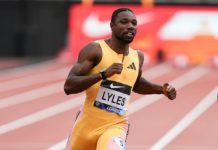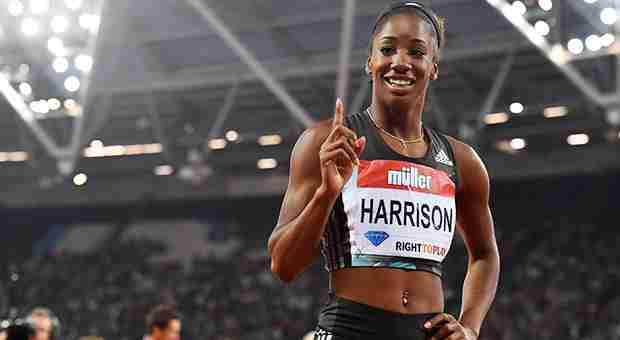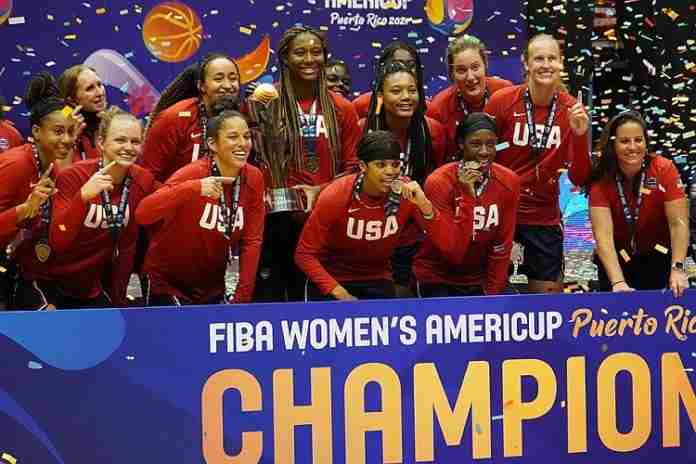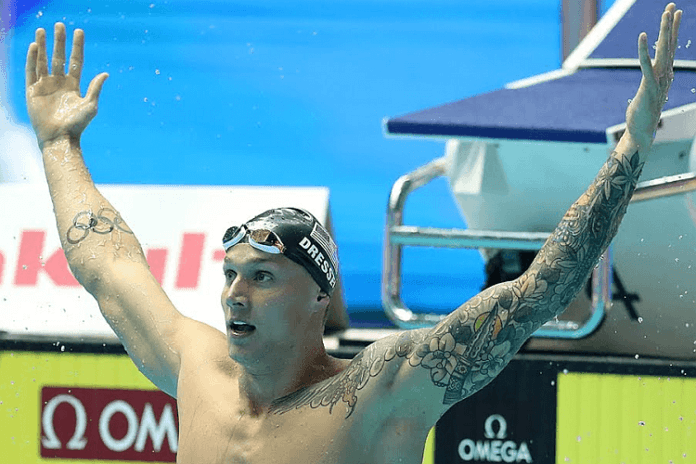(★ Friends: The new bill for server and support costs has arrived. If you would like to support our coverage, please donate here. Your enthusiasm is the reason this site continues. Thank you. ★)
Day three of the U.S. Olympic Trials at Eugene’s rebuilt Hayward Field was scheduled to last eight hours, from the decathlon 110 m hurdles through the final of the men’s 100 m, but it was worth it! The highlights, as they happened:
● Men’s hammer: The first final of the day saw the world’s no. 2 thrower, Rudy Winkler, set a meet record of 80.75 m (264-11) in the first round, his third-best throw ever and further than he ever threw prior to 2021!
He then unleashed his second throw further than anyone in American history: 82.71 m (271-4), erasing Lance Deal’s 1996 mark of 82.52 m (270-9)! It’s still no. 2 in 2021, but moves him to no. 20 on the all-time list. Wow!
Winkler came back to 80.98 m (265-8) in round three, a distance only he and world leader Pawel Fajdek (POL) have reached in 2021. Second and third were Daniel Haugh (76.93 m/252-4) and Alex Young (76.01 m/249-4), nos. 7 and 9 on the year list so far.
No let-up for Winkler, who reached 82.10 m (269-4) in round four, the no. 7 throw in U.S. history. Haugh improved in round five to 78.97 m (259-1) to strengthen his grip on second, Winkler finally showed he was human, throwing 79.61 m (261-2), a distance only four other American throwers have ever reached.
Young uncorked his best of the day in the final round at 78.32 (256-11) – a lifetime best – finishing third. That inspired Haugh, who got a lifetime best himself at 79.39 m (260-5), moving to no. 6 in U.S. history. Winkler then finished at 80.28 m (263-5), and will lead both Haugh and Young to Tokyo. Impressive.
● Women’s 100 m hurdles: The semifinals started with a non-false start, but on the re-start, LSU star Tonea Marshall stormed to the lead and never gave it back, winning in 12.50 (+1.2 m/s), holding off Christina Clemons (12.51), with Rio 2016 champ Brianna McNeal third in 12.56. Because McNeal is running under a stay of her doping suspension while her appeal is ongoing, a ninth runner will be added to the final.
Marshall, injured during the 4×100 m at the NCAA Championships last week, held out of the hurdles final and that looks like a good decision right now.
In semi two, world-record holder Keni Harrison was in front from the gun and ran away with the race in 12.50 (+1/3 m/s), same as Marshall. NCAA champ Anna Cockrell was second in 12.59 and Payton Chadwick was third in 12.64.
In the final, Harrison got a good start and took control of the race by hurdle three, winning by daylight in 12.47 (+0.8 m/s). Three lunged at the line for second, with McNeal getting there in 12.51, Clemons leaning perfectly for third (12.53) and Gabbi Cunningham fourth, also in 12.53 (actually, 12.521-12.526). Cockrell was fifth in 12.58 and Marshall was sixth in 12.63.
Cunningham – who missed by 5/1000ths – may yet be on the team pending McNeal’s appeal of her doping suspension to the Court of Arbitration for Sport.
● Men’s 100 m: World leader Trayvon Bromell and the legendary Justin Gatlin were in the same heat and in the same semi. Off the gun, Bromell got an excellent start and his small lead after 20 m got bigger and he won in 9.90 (-0.3 m/s), with Kenny Bednarek overtaking Gatlin in the final 10 m, as Gatlin leaned too early, 9.96-10.00. The 9.96 was a lifetime best for Bednarek.
Noah Lyles, Ronnie Baker and Fred Kerley were supposed to be the stars in semi two, and they finished 3-2-1 at the tape, with Kerley coming on in the final 10 m to win in 9.92 (+0.7 m/s), passing Lyles (9.97) and then Baker (9.94). Marvin Bracy-Williams, who had run 9.85 this year, pulled up after 30 m and had to talk across the line last in 17.82.
The final had Gatlin (at 39), Bednarek, Kerley, Bromell, Baker and Lyles in lanes 2-7 and Bromell got the best start and separated from the field in the final 10 m to win in 9.80 (+0.8 m/s). Baker and Kerley, on each side of Bromell, were right with him and finished 2-3 in 9.85 – lifetime best – and 9.86 – lifetime best – leaving the U.S. 1-2-3 on the 2021 world list.
Bednarek was fourth in 9.89, with Oregon’s Micah Williams fifth (possibly on the plane for relay duty) in 9.91. Lyles was slow off the start and was unable to mount his usual late charge, finishing seventh in 10.05. He’ll hope for better in the 200 m, Gatlin appeared to be hurt and jogged after 80 m, finishing in 10.87.
● Men’s 400 m: Michael Norman wanted to leave no doubt and he took off from the start, clearly in the lead heading into the far turn. He was challenged by Michael Cherry heading into the final straight, but Norman had the extra gear he’s famous for and ran away to win in 44.07, a seasonal best and still no. 2 in the world for 2021. Cherry had a lifetime best of 44.35, still no. 4 on the year in second.
Elija Godwin looked like a potential third-placer, but he faded badly in the final 75 m, while NCAA champ Randolph Ross stormed down the straight and passed Godwin (6th: 44.94), Vernon Norwood (5th: 44.92) and then North Carolina A&T teammate Trevor Stewart (44.74) to finish third in 44.74. With much more rest in Tokyo, Ross could challenge Norman for gold.
● Men’s decathlon: Former Georgia star Garrett Scantling, now 28, was fourth at the 2016 Trials, and dominated the field, piling up a 279-point lead going into the 1,500 m. He started the year with a lifetime best of 8,232 from 2015 and hadn’t competed in a decathlon since 2016 at the start of this year. But he scored 8,476 in April, and finished here in a startling 8,647, no. 2 in the world for 2021.
Former Big 10 champ Steven Bastien was third entering the 1,500 m and kept fourth-place Harrison Williams in his sights during the 1,500 m and ran away in the final 200 m to finish with the no. 2 time (4:22.21) and moved up to second with a lifetime best of 8,485, fourth on the year list. Williams finished fourth with 8,306; Rio seventh-placer Zach Ziemek, the 2018 national champion, scored a lifetime best of 8,471 (no. 5 in 2021) and ended up third.
● Women’s 400 m: All eyes were on Allyson Felix in lane eight and she charged from the start, taking the lead on the backstraight. But Quanera Hayes took control heading into the curve, passing Kendall Ellis for the lead. Wadeline Jonathas ran hard on the far turn and was even with Hayes heading into the straight, with Ellis third and Felix fading.
But while Hayes steamed home to win in a season’s best of 49.78, Felix charged from the back and passed Ellis in the final 20 m and then Jonathas at the line for second. Felix earned a season’s best 50.02, with Jonathas at 50.03 and Ellis at 50.10. Hayes moved from sixth to fifth on the 2021 world list and Felix – on her fifth Olympic team – is suddenly no. 8 in 2021, with her fastest time since 2017.
● Women’s high jump: The jumping really started at 1.90 m (6-2 3/4), with only five women left. Favorite Vashti Cunningham and Rio Olympian Inika McPherson both cleared 1.93 m (6-4) on their first try, joined by Nicole Greene on the second try, and Rachel McCoy on her third try, leaving four jumpers for three spots.
McCoy, Greene and McPherson all missed their tries at 1.96 m (6-5), but Cunningham sailed over, sending her to Tokyo. The other three all missed at 1.96, with McPherson second and Greene third; McCoy’s extra miss at 1.93 was the difference. Cunningham took three tries at 2.02 m (6-7 1/2), but missed all three times.
● Women’s triple jump: The three finalists with the Olympic standard were American Record holder Keturah Orji, former American Record holder Tori Franklin and Jasmine Moore. Orji took the lead right away at 14.40 m (47-3), then Franklin got a season’s best of 14.20 m (46-7 1/4) in round three, with Moore at 14.15 m (46-5 1/4) through three rounds.
That’s the way they finished, although Orji improved to 14.52 m (47-7 3/4) in round six and Franklin finished at 14.36 m (47-1 1/2).
The only qualifying-only event on the program is the women’s 3,000 m Steeple, with American Record holder Courtney Frerichs falling on the second lap of the first heat, but leading a couple of laps later in order to get out of trouble. She strung out the field and led a breakaway pack of five, with Marisa Howard and BYU’s Courtney Weymant closest. At the bell, Frerichs led by 5 m, but the pace clearly offered the chance for the Olympic qualifying standard of 9:30.00 and Grayson Murphy and Weymant surged off the last water jump to run 1-2 in 9:25.37 and 9:27.17 – getting the standard – with Frerichs jogging in third at 9:27.75. Howard was an auto-advancing fifth.
Former World Champion Emma Coburn had no interest in repeating Frerichs’s fall and she took off from the start and stayed out of trouble. She was joined by Leah Falland and Mel Lawrence in the breakaway after four laps and Coburn sailed home in 9:21.32, ahead of Falland (9:23.36) and Lawrence (9:29.30).
Worth noting: As this is the U.S. national championship meet for 2021, there is prize money at stake. The top eight places win $10,000-8,000-6,000-4,000-3,000-2,000-1,000-1,000 or $35,000 per event. Across 40 events, a total of $1.40 million is at stake.
The first half of the Trials concludes on Monday, with six finals, in the men’s 800 m, pole vault, triple jump and javelin, and the women’s 1,500 m and 5,000 m, before rest days on Tuesday and Wednesday.
You can receive our exclusive TSX Report by e-mail by clicking here. You can also refer a friend by clicking here, and can donate here to keep this site going.
For our 649-event International Sports Calendar for 2021 and beyond, by date and by sport, click here!




























